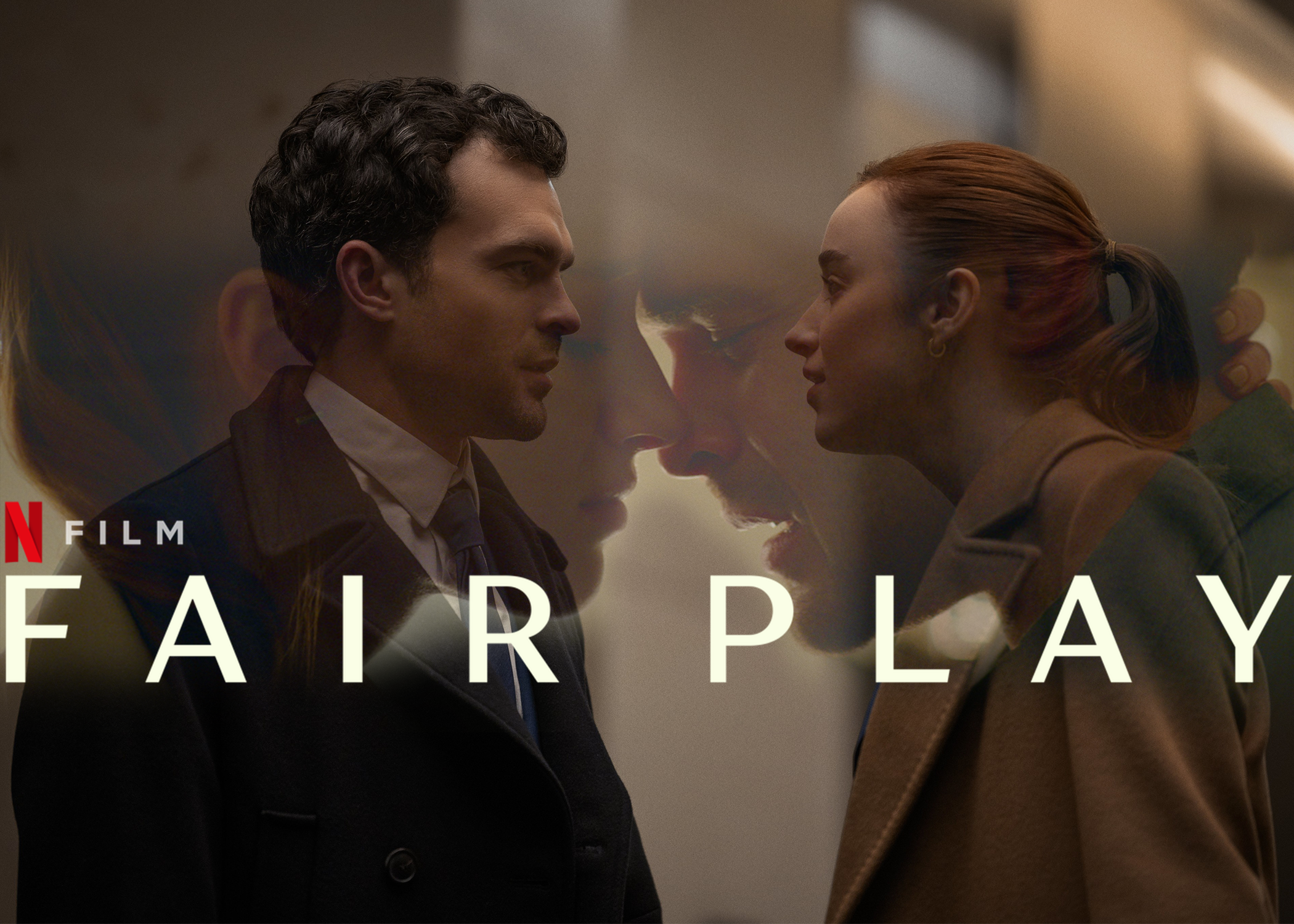Review | Work-life balance doesn’t exist in Chloe Domont’s new film ‘Fair Play’
Chloe Domont’s erotic new thriller depicts the trope we all know and hate: sexism in the workplace and men becoming insecure in their masculinity when a woman steps into a position of power over them. Photo collage by SIMRAH AHMAD, Staff Photographer
Spoiler alert: This article contains minor spoilers for the erotic thriller “Fair Play.”
Once again, I am reviewing a movie circling the stock market, and once again, I don’t understand investing. While “Fair Play” is an erotic thriller told from the perspective of a female executive in a male-driven field, it and “Dumb Money” are similar on some level: hot actors playing hot people in New York City being stupid with money and power.
The film follows Emily (Phoebe Dynevor) and Luke (Alden Ehrenreich) as ruthless financial analysts at a New York financial firm. By day, they spend their time in the office crunching numbers on their computer screens and ignoring each other. By night, they make love to each other in their tiny apartment. Newly engaged, their sexual tension and need to be in each other's pants is at an all-time high. So far, they have successfully kept their relationship a secret from the human resources department and the men at the office. No one has noticed their goo-goo eyes across the bullpen. At least, not yet.
The drama begins when a portfolio manager at the company quits. Both Emily and Luke are dying to be the replacement. They love each other… but they love their careers a tiny bit more. Emily initially hears a rumor that it will be Luke filling the empty desk, but when she is called at two in the morning to meet her boss, Campbell (Eddie Marsan), at the bar, the opposite becomes true. The change in power dynamics sends her relationship with Luke off into the deep end, and the cracks in their engagement begin to creep to the surface.
Before watching “Fair Play,” I had only seen Dynevor in “Bridgerton” and Ehrenreich in “Cocaine Bear” and “Oppenheimer.” Both of them clearly have the ability to carry a film on their backs, season one of “Bridgerton” and “Solo: A Star Wars Story,” respectively, being great examples. This is their first time leading a character-driven project where they get to shine in the spotlight and show off their acting chops, and they knocked it out of the park. Was I glazing over the fact that Dynevor’s American accent was unbelievable? Or maybe ignoring that Ehrenreich’s face makes me think of a coked-out bear lying on top of him? Possibly, but my niche Letterboxd following doesn’t need to know that.
While some minor characters like Campbell and the copy-and-paste finance bros contribute to the disgusting office culture in which our film takes place, their performances don’t hold a candle to the chemistry of our toxic lovebirds. Audiences should know this relationship is doomed from the start.
Right from the film's first sequence, everything points to a not-so-fairytale ending. The sinister color palette. The daunting music. The proposal to your girlfriend in the bathroom of your brother's wedding after you accidentally make a mess during her special womanly time of the month, getting blood everywhere, and the ring you bought falls out of your pocket (quite the traumatizing first five minutes). So romantic.
So why do we keep watching, yearning for more? Have we not learned from our past mistakes about what happens when people start dating in the workplace? What makes “Fair Play” a story worth watching is not where our characters land at the end of the film, but instead, how they destroy each other's careers and sanity to get to that point.
Contributing to the insanity that Emily goes through over two hours is the abundance of typical alpha-male sex-driven men surrounding her (Luke being the worst of them all). There were multiple scenes where I wanted to slam my computer screen down and bang my head against a table, but is that not the point? If Domot’s goal was to make the audience's blood boil every time a man showed up on the screen (every scene of the film), she succeeded.
When Luke finds out Emily got the job over him, he puts on a nice face, trying to be happy for his fiance. Yet, he clings to this idea that he is entitled to the position over her because he believes he has wanted it longer. It’s this deep insecurity that a woman in this case can be better at something than a man that subconsciously sets him off. It is not about the fact that she has better instincts and works harder than him, but his need to be the breadwinner in the relationship and that his masculinity is in jeopardy if not.
What puts this film in the thriller genre is not the monsters in the closet, but the monsters you fall in love with in everyday life. The ones who turn on you because they are jealous of your success. This film perfectly portrayed men’s resentfulness to let women succeed in an industry that has favored them for all of history. The moment they feel threatened, they don’t play fair.
For so long, movies about finance have been told from the male perspective. It's refreshing to see something new thrown into the mix next to “The Wolf of Wall Street” and “The Big Short.”
Is the film perfect? No. While I appreciate putting female narratives in worlds that haven’t seen them before, like the stock market, this story isn’t as empowering as it sets out to be. There is no long-lasting win here for women and no progress made to the toxic male-centered workplace by the message in this film. Do I think it is worth the watch? If you have two hours to spare listening to hot actors sitting at desks, having sex and screaming at each other, then yes.


